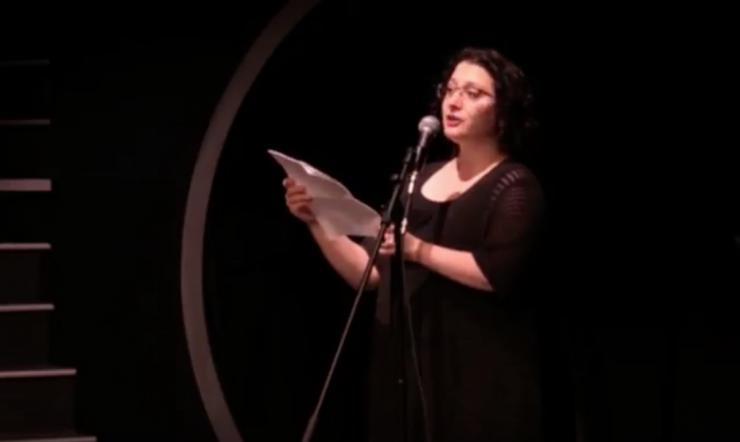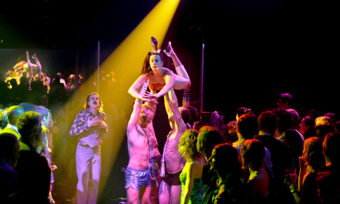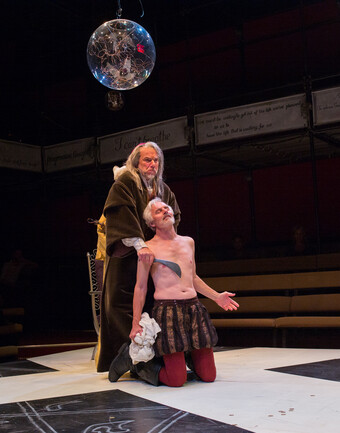On Harassment Policies for Critics in the Age of #MeToo
Following the outing of serial abusers Al Chase and Israel Horowitz, the New England theatre community has started taking a closer look at its inclusion and harassment policies. These recent events have led to a greater concern for implementation of best practices on an individual, company, and community-wide level, such as our local theatre service organization StageSource’s Line Drawn Summit in June. New England is buzzing with the potential for positive change.
I serve as Queen Geek (yes, official title) of The New England Theatre Geek (NETG), an activist blog that offers constructive performance critiques from both civil and artistic perspectives. I employ eight critics: three are Geeks of color, six are female identified, and one of us identifies as non-binary. I am proud to say that we offer perspectives other outlets do not by virtue of our being different.
At NETG, we believe that critics and reviewers are an integral part of the arts ecosystem. To us, behaving as outsiders implies a bourgeoisie classism that has no place in the theatre. I encourage my Geeks to engage on an equal level with the theatre community outside of criticism. It behooves arts journalists to integrate into the arts as conscientious equals and not “objective” observers. This means journalists must establish permanent vested interest in the social aspects of the arts. Arts journalists must stand with our fellow artists against violence. Remaining outside of the struggle toward safer spaces for victims and justice for the entire arts community sends the message that journalists stand with the abusers. We must take a stand against abuse publically, and also personally.
In thinking through these issues for myself and my blog, I realized a personal oversight: NETG had a reviewing policy, a mission statement, and an inclusionary statement, but no harassment policy. Employees of NETG largely write from home, coffee shops, or personal offices. Our position grants us relative anonymity; harassment is kept to a minimum in person. Unfortunately, this is not always the case online. Our new policy intends to protect staff from online and in-person harassment, extending to companies and individuals who lash out when they don’t appreciate a review. It includes email harassment and passive aggressive tweets. The internet is dark and full of horrors but that doesn’t mean we can’t be civil to one another on a public forum.
The policy is based on the “Chicago Theatre Standards,” a document with potential to alter New England’s theatre landscape for the better. These policies can protect the marginalized and defang the administratively untouchable. It quotes the Chicago Theatre Standards Pilot Project to define harassment in plain terms and describes consequences if one is found guilty of harassment. Most importantly, it includes lines defending a victim’s right to credibility and privacy, and making clear that anyone found guilty of misconduct will have their relationship with NETG suspended.
Theatre advocates, artists, administrators, production staff, patrons, and everyone else in the community must take personal interest in fostering spaces free from abuse.

Adopting this type of public harassment policy is, as far as I can tell, an unusual step for a blog. The American Theatre Critics Association (ATCA) has a Code of Conduct for members, but it warns members that they will be ejected for disreputable behavior in the name of journalism, rather than addressing the responsibility of the organization to protect its members.
A public policy like NETG’s isn’t enough, though. Theatre advocates, artists, administrators, production staff, patrons, and everyone else in the community must take personal interest in fostering spaces free from abuse. This means making our spaces unsafe for predators and predatory behaviors. For journalists, this means remaining updated on theatre’s social sphere.
Predators are sheltered within theatre communities that unwittingly foster abuse. It’s easy to point fingers. When a local actor bravely shared his story of abuse from critic Al Chase on Facebook, I directly called out the Independent Reviewers of New England (IRNE) Awards Committee, of which Chase was a member. In response, committee members decried personal responsibility. How were they to know that Chase engaged in these deplorable behaviors?
There are always signs. Humans develop blind spots in which abusers hide. These very blind spots are the excuse our theatre leadership uses to remain inculpable when a predator is revealed. Irresponsible leadership inspires sexual predators and casual harassers to be brave. To save our community, we must make predators afraid.
Al Chase resigned from the IRNE Committee. A statement was issued ahead of the 2018 awards ceremony and, as far as the public is concerned, that was the end of it. The arts journalism community wiped its hands of Chase and that was that. But New England theatre critics and reviewers deserve better. The theatre community deserves better. If we forget how and why Chase was allowed to behave as he did and still remain a figure within the reviewing community, more will replace him and nothing will change. The theatre, including arts journalism, needs to change.
Our community must be responsible for removing its predators for the sake of a safe, more equitable working space.
I had the privilege of speaking at the StageSource Town Hall on 15 May 2018, much of which was livestreamed and archived on HowlRoundTV. I suggested several practices to protect our community: intentionally making space for persons of color, non-binary, disabled, young individuals; asking men to #leanout so women can receive credit for their work; calling upon people of minority status to step up to leadership roles; for theatres to discontinue accepting work from abusers; and for our community and related organizations to take responsibility for the crimes enabled by inaction.
Our community must be responsible for removing its predators for the sake of a safe, more equitable working space. As Queen at the New England Theatre Geek, it is within my personal and professional mission to protect and serve my Geeks. As a journalist, my mission extends to the theatre community. I firmly believe that if an individual cannot contribute to our community without causing damage to others, they must be removed. It isn’t enough to condemn predatory behavior; we all must act to prevent it. Creating spaces free from harassment and bigotry for women, people of color, LGBTQ+, and the disabled is as simple as implementing standard policies such as mandatory training, investigating claims swiftly, and protecting victims. That so many within our community have not felt comfortable sharing experiences of abuse for so long speaks a great deal to what we collectively do and do not value.








Comments
The article is just the start of the conversation—we want to know what you think about this subject, too! HowlRound is a space for knowledge-sharing, and we welcome spirited, thoughtful, and on-topic dialogue. Find our full comments policy here
Recently, there have been many issues going on in the theater community in terms of inequality and disrespect. The Me Too movement has been one that has woken up many people about the issues in the entertainment industry, thus raising awareness which essentially was the main goal, due to the fact that no one knows what is going on behind the scenes. To read that a fundamental issue, such as harassment, is not clearly addressed in a theater’s policy, is something I found surprising. In a way, it makes sense that there have been an abundance of sexual harassment cases throughout the past year or so which have been a result of the fact that is because no one is talking about the issue. This article has informed me that other people in the industry have also been making efforts to do the same. Being a student who aspires to be involved in the industry, reading this article has given me some solace. Though there is more awareness to be made and evolving to be done, it is reassuring to see that many are noticing the problems and advocating for the rights of people involved in theater.